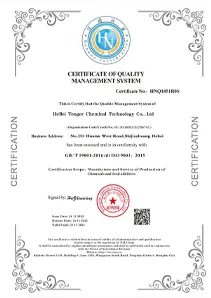
Zinc Sulphate Fertilizer - Enhance Your Soil's Nutrient Content
The Benefits of Zinc Sulphate Fertilizer for Agriculture
Zinc sulphate is an essential micronutrient fertilizer that plays a critical role in agricultural practices. Zinc (Zn) is one of the vital trace elements necessary for plant growth, and its deficiency can lead to several growth-related issues. Zinc sulphate is widely used in various crops, including cereals, legumes, fruits, and vegetables, due to its numerous benefits.
One of the primary functions of zinc in plants is its involvement in enzyme systems. It acts as a cofactor for over 300 enzymes, facilitating crucial biochemical reactions. These enzymes are critical for processes such as protein synthesis, energy production, and photosynthesis. Without sufficient zinc, plants may exhibit stunted growth, yellowing of leaves, and poor crop yield.
The Benefits of Zinc Sulphate Fertilizer for Agriculture
Zinc sulphate is often favored over other zinc fertilizers because of its high solubility and quick availability to plants. It can be applied to the soil or delivered through foliar sprays. When applied to the soil, zinc sulphate penetrates quickly, allowing plants to access zinc in a timely manner. When used as a foliar application, it ensures that plants receive an immediate boost of this essential nutrient, especially during critical growth stages.
zinc sulphate fertilizer

Additionally, zinc sulphate can improve the overall health of the soil ecosystem. It helps in the synthesis of chlorophyll, enhancing the green color of leaves and promoting better photosynthesis. By improving photosynthetic efficiency, crops can produce more energy, leading to increased yields and better quality produce.
Furthermore, crops treated with zinc sulphate often exhibit greater resistance to diseases and pests. Healthy, robust plants are less susceptible to stress from environmental factors such as drought and nutrient deficiency. This resilience translates into more stable harvests, a crucial factor in ensuring food security.
In the context of sustainable agriculture, the use of zinc sulphate can help balance nutrient levels in the soil, contributing to improved soil fertility. As farmers increasingly seek environmentally friendly practices, zinc sulphate represents a viable solution to addressing zinc deficiency while minimizing the environmental impact of chemical fertilizers.
In conclusion, zinc sulphate fertilizer plays a vital role in modern agriculture by supplying essential nutrients that enhance plant growth, improve soil health, and increase crop yields. Its application not only supports the growth of healthier plants but also contributes to sustainable farming practices, ensuring food security for future generations. As farmers and agronomists continue to recognize the importance of micronutrients, zinc sulphate will undoubtedly remain a key component in fertilizer strategies worldwide.
-
Nitrile Rubber Honoring Strict Production StandardsNewsAug.22,2025
-
Aspartame Ingredients Honoring Food Safety ValuesNewsAug.22,2025
-
Fertilizer for Balanced Plant NutritionNewsAug.22,2025
-
Cyanide Gold Processing with High Purity AdditivesNewsAug.22,2025
-
Formic Acid in Textile Dyeing ApplicationsNewsAug.22,2025
-
Aluminum Hydroxide Gel in Skincare ProductsNewsAug.22,2025
-
Regulatory Compliance for Global Mining Chemicals UseNewsAug.12,2025
Hebei Tenger Chemical Technology Co., Ltd. focuses on the chemical industry and is committed to the export service of chemical raw materials.
-

view more DiethanolisopropanolamineIn the ever-growing field of chemical solutions, diethanolisopropanolamine (DEIPA) stands out as a versatile and important compound. Due to its unique chemical structure and properties, DEIPA is of interest to various industries including construction, personal care, and agriculture. -

view more TriisopropanolamineTriisopropanolamine (TIPA) alkanol amine substance, is a kind of alcohol amine compound with amino and alcohol hydroxyl, and because of its molecules contains both amino and hydroxyl. -

view more Tetramethyl Thiuram DisulfideTetramethyl thiuram disulfide, also known as TMTD, is a white to light-yellow powder with a distinct sulfur-like odor. It is soluble in organic solvents such as benzene, acetone, and ethyl acetate, making it highly versatile for use in different formulations. TMTD is known for its excellent vulcanization acceleration properties, which makes it a key ingredient in the production of rubber products. Additionally, it acts as an effective fungicide and bactericide, making it valuable in agricultural applications. Its high purity and stability ensure consistent performance, making it a preferred choice for manufacturers across various industries.





